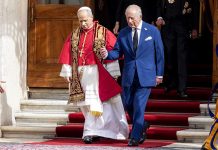Every March 6, Ghanaians celebrate the birth of a nation. In the many years that have passed, since the Union Jack was lowered, and the red, gold, and green with the black star in the middle was raised to the joyous roar of ‘freedom,’ followed by the song: ‘There is freedom for us’, much has changed since then —–the corporatist, paternalistic welfare state has run out of money, while the freedom and independence promised the people still eludes them.
Any patriotic Ghanaian may be aware that citizens are alienated from the 6th March celebrations. There are no spontaneous citizen gatherings where participants celebrate their hard-won independence the way they know best —– parties, bonfires —- without the state hanging over their necks. March 6th has become a partisan day of force when the state and politicians exhibit the power of the coercive state.
Schoolchildren are forced to march under the sun; the leader is seen taking the salute with the security forces showing their intimidator powers and ordinary citizens are left out or simply do not care.
What, exactly, has happened to Ghana since 1957? What does being independent today mean —and what should it mean?Freedom at last! This euphoric cry, which rang across Ghana that March day, is still, but an echo.
What does “independence” mean when Ghana continues to depend on neo-colonial institutions? Is there “liberation” when our leaders continue to fail in their promises of prosperity, and social justice?
As we celebrate Ghana’s independence this month, it is good to look at our leaders, past and present, and see how their actions and inactions have contributed to the continuous underdevelopment of this rich and blessed country.
In this context, how should we remember our founding fathers, especially Kwame Nkrumah? Partisans hail him as a “liberation” hero who led the fight to end colonial rule, while others still insist that his transformation into a malicious dictator after “independence” taints whatever good he achieved in his earlier years.
Freedom was just a slogan. Shortly after independence, democracy, pluralism, and competition were denounced as both alien and “imperialist dogma.” A one-party state rule was imposed on the people, concentrating power in the hands of one individual to determine who gets what in Ghana.
For a country that prides itself on the motto ‘Freedom and Justice’, there are a few things that seem, well, off. Almost all Ghanaian leaders have rejected the freedom the free market gives individuals. Especially, Nkrumah, the first president, harboured a deep distrust and distaste for the freedom the free market brings and gives. He falsely perceived it as an extension of neo-colonialism and imperialism.
State dominance of the economy is always wrong and leads to poverty. It is not part of Ghanaian culture. Traditional Ghana was never socialist. It had private ownership of the means of production, such as land, labour, and capital, and fostered a spirit of entrepreneurship, free enterprise, and free trade.
Trade flourished in pre-colonial Ghana, with commercial routes crossing the country. Ghanaians were free to engage in trade and business without needing permission from their chiefs. The market, not the chiefs, determined prices.
Ghanaians did not envisage that freedom would ever mean looking to the government or technocrats for their economic salvation. Also among those disillusioned with the promise of freedom are young people.
Young people have experienced several traumas over the past 20 years— economic and financial crises, a pandemic, —and have carried much of the burden. To the young, the state offers jobs, “opportunity,” and the legitimation of envy. Therein lies the path to cultural decline and eventual collapse
We now know that big government with —the cronyism, corruption, and oppressive taxes that have made living a virtuous life unbearable. The country is on the brink of an economic collapse as politicians, intellectuals, and mediocre businessmen now only take from the state, and cannot create or add value.It would have been inconceivable that Ghanaians would trade their liberties for the lie of perpetual economic security via the state.
Sixty-seven years on, it seems a “convenient consensus” has emerged, on the need for a mixed economy welfare state, and multi-party democracy. However, we have not reached the end of political division in this country.
What we have, is worse today than it has been since the United Party (UP) and the CPP fought over independence. Indeed, the angry prejudices, paranoia, and folklore ricocheting through social media, and talk radio, enjoy much greater intensity today than they did half a century ago.
Of course, our freedom now gives us free speech and free and fair elections. As important as these commitments are to our country, many Ghanaians, especially those in the rural areas, remain alienated—not only from the wealth of the nation but from the independence story.
We have not made profound strides toward a more just society. A sober view of our history requires honesty about the history of our independence and the persistence of poverty in Ghana.
Any political system, which gives big powers to one person or a few always degenerate into tyranny. Economic progress suffers, as always when the state controls the economy. Poor planning and coordination result in the dislocation of industries, low morale, lack of discipline and accountability, nepotism, disincentive to produce, and chronic shortages of goods and services. Black markets naturally emerge; bribery and corruption thrive, lining the pockets of the elites and making them even more powerful.
We need to move on. Nevertheless, before we can do that we need to dismantle the oppressive state, give back the people their lost freedoms,and reach for a Ghanaian solution to the problem of wealth creation.
Real freedom would dismantle the de facto apartheid factions of partisanship and cronyism, which those in power use in government to advance their interests and exclude everybody else, thus leading this country into economic disaster.We need a new ideology going forward.
Because our politicians no longer even pretend that their pursuit of power is not rooted in any commitment to ideas, we are using the word “ideology” to describe, in a neutral manner, some set of reasoned and coherent principles and policies, however mistaken, around which a society can be organized. We call ideology “the commitment to the values of ideas.”
We need a new revolutionary mindset and ideas to move this country forward. The old ideas and belief that the government is the main driver of growth and innovationthat came to fruition in 1957 and continuedid not stand the test of time because they were faulty from the start. This errant belief threatens our fiscal solvency and our ability to solve the serious problems we face as a nation.
As we mark the sixty-seventh anniversary of our nation’s founding, it is important to remember that freedom is not just a catchphrase. Freedom is about morality and taking ownership of one’s own actions. It is about striving for personal growth and contributing to society. Freedom is about acknowledging the unique qualities of each individual and acknowledging the immense advantages of free markets.
As we celebrate independence, we should not focus oncreating a dystopian country with oppressive attacks on personal property, and regulations that drive away private initiative.
Our focus should be to confront and defeat the political forces that continue to promote a major government role in our lives and push the cause for cooperatives that can neither be scaled up nor regulated. Market policies are required to address the persistent poverty and allow the poor to utilise their talents.
We need visionary leaders who understand that the best way to address pressing public problems is to empower private individuals and businesses. The government-first approach of our politicians is tricky because it replaces entrepreneurial innovation with government rules and regulations. Unless reversed, this government-centric approach will undermine our ability to adequately resolve many pressing challenges.
By Kwadwo Afari
The views expressed in this article are the author’s own and do not necessarily reflect The Chronicle’s stance.









